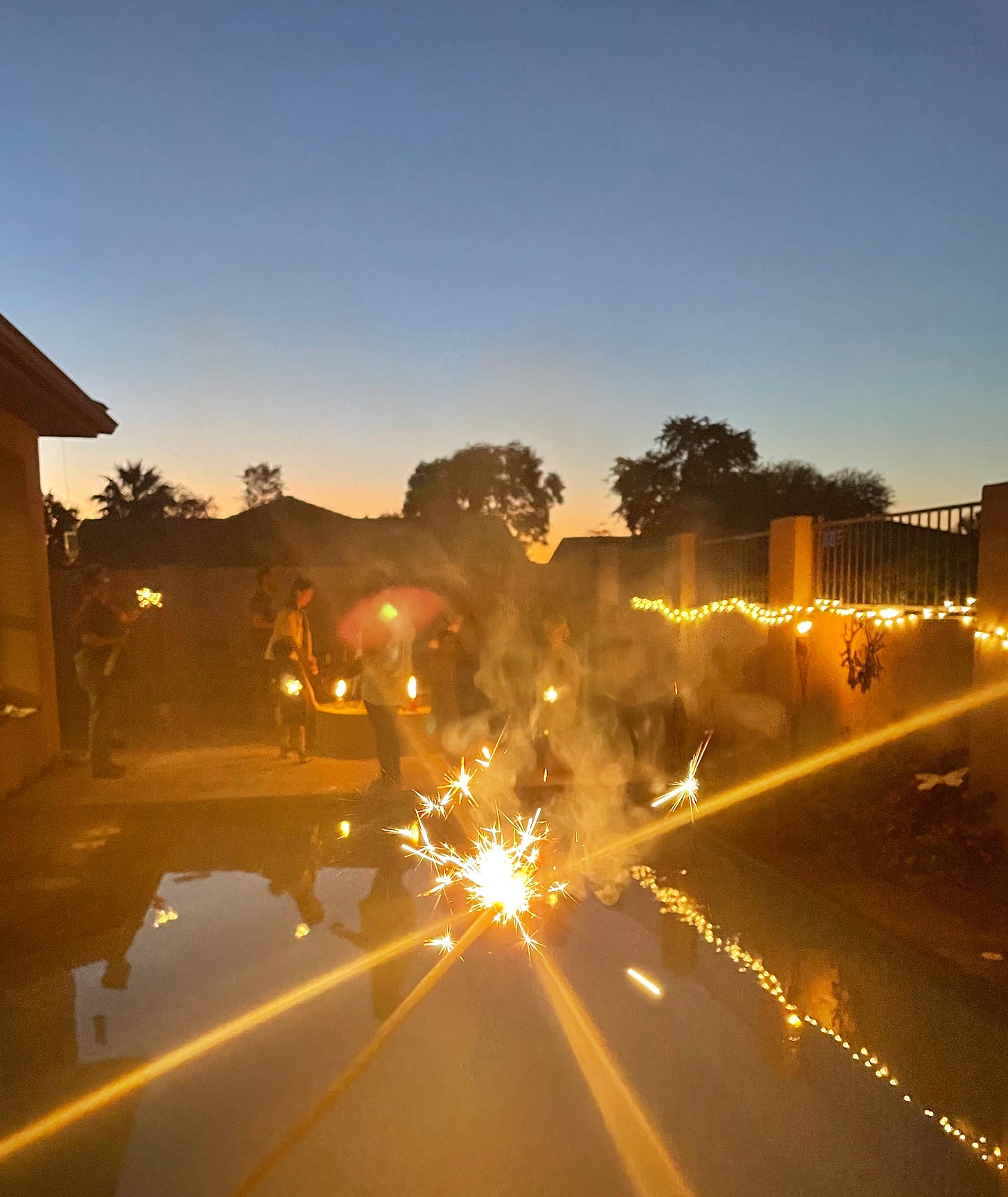Tomorrow is Diwali, most commonly known as the Festival of Lights. Celebrated by Hindus, Sikhs, & Jains (as well as more secular folks with cultural ties to these traditions and/or India), Diwali stands for new beginnings and commemorates the victory of good over evil. In accordance with Hinduism’s modified lunar calendar, Diwali is observed on the day of the new moon, when the sky is at its darkest. It is traditional to light lamps, string lights, and set off fireworks to symbolize the triumph of light over dark.
I love this holiday—I always have, from the little kid excitement of new clothes and staying up late + gorging myself on my aunties’ best dishes, to the very first Diwali party I ever threw, cooking on my own for the first time in my tiny grad school apartment kitchen just a few months after my father’s death. If you know me, you know I love ritual for this very thing; the way that tradition walks with us through the stages and pathways of our lives. I can trace the unfolding of my self and the ups and downs of my loved ones as I move backward through the memory of Diwali parties past. Marriage, divorce, birth, death, illness, recovery—all are woven into the mix.
As I change, my understanding of Diwali does, too, similar to the way that you might revisit a book or piece of art over the years and find that it speaks to you newly. Here’s the thing I don’t think I really understood before: the darkness is an essential part of the story.
My girlfriend recently gifted me a copy of Barbara Brown Taylor’s Learning to Walk in the Dark, which I adored. Taylor is an ordained Episcopal priest and my kind of theologian; someone who has allowed her lived experiences to change the way she thinks about God and spirituality. In Learning to Walk in the Dark, Taylor addresses the way in which many contemporary spiritual traditions attempt to bypass darkness, seeing it as no more than a foil to light, the star of the show. But there are real, problematic limits to this, as BBT points out:
“I have learned things in the dark that I could never have learned in the light, things that have saved my life over and over again, so that there is really only one logical conclusion. I need darkness as much as I need light.”
This I get, like, in my bones. There has been a lot more dark in my life in the last year or so than I bargained for: loneliness, fear, doubt, frustration, despair, uncertainty, anger, confusion. These are not feelings I have much facility with, for I have grown up inside of a culture that encourages all of us to push through those feelings, stuff them down, and put on a happy mask. Spending time with these feelings, these parts of myself, hasn’t been easy or very much fun. Honestly, sometimes it really sucked. And - I wouldn’t trade any of it. (Well, maybe I would give a little of it back if I could! LOL.)
Why? Because I have learned so much about myself. I have developed facility I did not before have. The things that used to scare me—well, they don’t anymore. Once I let my eyes adjust to the dark, I was able to see all kinds of beauty I had missed, in myself and in those around me. I have never felt closer to God or more committed to my values of love, generosity, & joy. And I know I couldn’t have gotten to this place without spending time in the dark.
Tomorrow I’ll celebrate Diwali with friends and chosen family. Things will look very different than they have in the past, including the fact that I am now mindful to hold both parts of the story in my heart—not just the triumph of the return to light, but those days (or months or years) spent in the dark, allowing it to change and teach us so that we may “make of ourselves a light”* once again.
Much love to you all,
Nishta
*commonly attributed to the Buddha
PS: If you want to get into the Diwali spirit, here’s a playlist I did not make but recommend.






This pulled up the Mary Oliver poem, “The Uses of Sorrow”:
(In my sleep I dreamed this poem)
Someone I loved once gave me
a box full of darkness.
It took me years to understand
that this, too, was a gift.